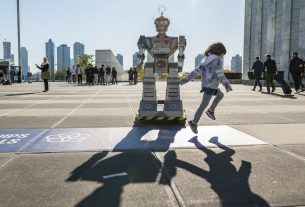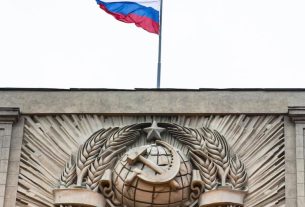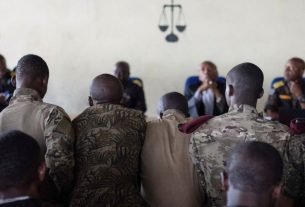Oleksandra Matviichuk, head of the human rights organization Center for Civil Liberties (Photo:Amanda Andrade-Rhoades/ AP / East News)
Oleksandra Matviichuk, head of the human rights
organization Center for Civil Liberties, and now also a Nobel laureate, spoke
about the Nobel prize award ceremony, about the projects she is proud of, and
about her attitude towards Russians, in an interview with the New Voice of
Ukraine.
On December 10 from the stage of the city hall the Norwegian capital Oslo, the Ukrainian language proudly and loudly rang out. Oleksandra Matviichuk, head of the human rights organization Center for Civil Liberties (CCL), which was awarded the Nobel Peace Prize this year, addressed esteemed representatives of the world community with a powerful speech. For the past 15 years, the CCL has been advocating for human rights and is well known to the Ukrainian public for its initiatives, which have involved thousands of people. The most famous of them are Euromaidan SOS legal assistance program and the global Save Oleh Sentsov campaign, which led to the release of the Ukrainian director and 34 other political prisoners from Russian captivity.
Now, the human rights activists have become the first Ukrainians to receive this highest honor at the award ceremony in Oslo, although they shared the stage and the award with Russian and Belarusian colleagues, the Memorial organization and human rights activist Ales Byalyatsky, respectively.
Oleksandra Matviichuk gave an interview to NV immediately after the Nobel ceremony.
NV: What did you feel during the award ceremony, and what was your first thought when you received the award?
Matviichuk: At the beginning of my speech, I mentioned that it was the first time the Ukrainian language was heard at the official Nobel Peace Prize ceremony, and that this was important for me, because Russia says that the Ukrainian language does not exist. After that, the audience burst into applause, and at the end of the speech, when I called for solidarity and support for Ukraine, the hall rose to its feet.
I feel proud that I am part of the Ukrainian people, because this award, which I now hold in my hands, is a symbol of the efforts of the entire Ukrainian people, who have the courage to fight for their values.
NV: You received this award alongside Russian and Belarusian human rights activists. How do you feel about this? Because today, the decision to go on the same stage with representatives of the aggressor countries is being perceived rather unevenly.
Matviichuk: It should be understood that this award is not given to countries. And this is by no means the old Soviet narrative about fraternal peoples, which causes people fairly justified irritation when we are in a bloody war, defending our freedom and democratic choice.
This award is given to people and human rights activists with whom we have worked for many years and jointly documented war crimes during the war. They helped us protect the rights of Ukrainian political prisoners, both in the Russian Federation and in the territories occupied by Russia.
This is a very human story and this is a repetition of the well-known slogan of dissidents, which I heard from my teacher Yevgeny Sverstiuk: “For your freedom and ours.” This is how I perceive [the award]. Here in Norway, the first question I got when I got off the plane was why we refused to give a joint interview. I explained that Ukraine is fighting for its right to be its own country, we all have something to say, and it would be very correct to speak out loud in individual interviews.
NV: This year, the monetary part of the award is 10 million Swedish kronor ($960,000). Have you thought about how the CCL will spend this money?
Matviichuk: It is clear that in no circumstances are we going to keep the money for ourselves, and now the organization is discussing how best to use it for the benefit of Ukraine and the people here. There are many areas that need financial assistance, but we have identified three: recovery, support for those in need, and the fight for justice. If we are talking about a specific project, then we will not manage these funds, as there are many organizations working in these areas.
So far, there has been no communication regarding the transfer of the sum to us, and these funds will not appear in our accounts in the near future, so there is time to make decisions.
NV: What opportunities for your future human rights activities can the status of a Nobel laureate bring?
Matviichuk: This award is considered one of the most prestigious for a reason, and it presents a unique opportunity for Ukraine to say out loud those things that few people paid attention to before.
For eight years now, we, as human rights activists, have been talking about the problem of people illegally imprisoned by Russia, but for the last two years, no exchanges have taken place at all either in Crimea, or in Luhansk, or in Donetsk Oblasts.
But now the Nobel Peace Prize has brought us attention: before the ceremony had even taken place, we had already seen great attention both to the problem we have been working on and our proposals for its solution. This attention is not only from the media, which opens up to us audiences and countries whose audiences were previously inaccessible to us. It is attention from decision makers.

Дайджест главных новостей
Бесплатная email-рассылка только лучших материалов от редакторов NV Рассылка отправляется с понедельника по пятницу
And we are using every opportunity that the Nobel Peace Prize gives us both to return home all the people illegally imprisoned by Russia, and to bring Putin and other criminals to justice.
NV: What is the condition of Ukrainian prisoners in Crimea and Donbas today? What is happening to them and is there any hope for their release?
Matviichuk: The circumstances have really changed a lot, including in terms of the volume of our work. If earlier we were talking about more than a hundred people imprisoned for political reasons in Crimea and several hundred in the occupied part of the Donetsk and Luhansk Oblasts, now there are about 700 civilians alone in the CGS database. These include people from Kyiv Oblast who were illegally taken to the Russian Federation and are being held there in a pre-trial detention center without charges. They include people from Kharkiv and Kherson Oblasts, from all the places where there have been Russian troops.
And those who have been sitting in prison for several years have been in a very tense situation, because with the start of a full-scale invasion, they have lost all hope of a quick exchange. Many of them have gone through hunger strikes.
In every possible venue, we are speaking about the importance of the immediate release of all illegally held civilians and the speedy return home of all prisoners of war. For example, I raised this issue in a private conversation with French President Emmanuel Macron. The pressure of the international community on the Russian Federation is needed so that it begins to respect at least some basic principles of international law.
NV: You have been giving speeches in many different countries lately. Is there an understanding of Ukrainian realities in Europe and the world?
Matviichuk: After the full-scale invasion, I began traveling only in May. Before that, I was working in Kyiv. I started doing advocacy visits to different countries because we needed international support, and for this we needed to personally meet and talk with senior officials, journalists, diplomats, and decision makers.
I have seen politicians slowly change their awareness that the old world they used to know is gone. And we need to make bold decisions in this new world – we need to support Ukraine in all dimensions: military, economic, diplomatic, and informational.
There is a big problem in that the civilized world is used to making concessions and forced compromises with dictators, but Ukrainians’ readiness to boldly defend their freedom and democratic choice often evokes admiration, but also sometimes surprise. We have to explain that we are not just fighting for territory, but for the people living in these territories. And that for Ukraine, there is no question of any compromises at the expense of people who are left face to face with the occupiers.
All this is further complicated by the demand for peace in some very simplified version that exists in a number of countries. Using the examples of war crimes that we document, I explain that there can be no sustainable peace in our region without justice.
It very much depends on the country, but Russian propaganda is operating everywhere, and its messages are tailored to each country. For example, we have worked with the Global South, where even at the level of human rights organizations, we had had little previous contact with Kenya, the Republic of South Africa, or other such countries. There, this narrative that Russia is actually at war with NATO was very clearly visible. And people were genuinely surprised when we explained that this war was anti-colonial in nature, because we are fighting for freedom in every sense.
When talking about developed democracies, then Russia’s nuclear war blackmail really worries people there. I once got into a conversation with a taxi driver in Paris, and he absolutely seriously said that the Ukrainians should stop fighting, because the Russian Federation would use a nuclear bomb and that would be very bad for everyone. I asked if he had seen pictures from Bucha, and what could be worse than that? That is, nuclear bombs have not been frightening to Ukrainians for a long time. This is the fear that is still being manipulated in the West. This is the logic of authoritarian leaders: as soon as they see fear, they know that it is possible to move forward.
NV: Tell us about the case that you consider a personal victory and that your Center is most proud of?
Matviichuk: I remember September 7, 2019, when the plane which so many people were waiting for arrived. Oleh Sentsov and 34 other political prisoners disembarked. In 2017, when Oleg began his hunger strike, I was a student at Stanford, and in order to reinforce his call for the release of Ukrainian political prisoners, I launched the Save Oleh Sentsov global campaign. Synchronized demonstrations were held in more than 35 countries. And these were appeals not to the abstract Putin, but to national governments with what they should do to secure the release of Oleg Sentsov and all the other people imprisoned in the Russian Federation. During the first month, we managed to get resolutions adopted in the European Parliament, the Parliamentary Assembly of the Council of Europe, and the OSCE Parliamentary Assembly. But, of course, the question was not in these documents, but in the fact that this pressure, which became possible only because thousands of people joined the fight, led to the fact that that plane did arrive, and these people were able to embrace their relatives.
I had two emotions. The first was extraordinary joy, although I watched it, like millions, on social networks and on broadcasts. The second emotion that I feel every time there is a prisoner release is the desire to be with those people whose relatives have not yet returned and who very much wanted their loved ones to have been on that plane.
NV: Tell us about a project which emboldened you and served as a turning point for you personally?
Matviichuk: I would probably say the success story of the Euromaidan SOS initiative. Hundreds of people were killed, arrested, tortured, brought up on trumped-up criminal and administrative charges, all passing through our hands. Only later did I understand the meaning of our work: at that moment we were up against a whole state machine, when the “titushki” coordinated their activities with prosecutors, and the prosecutors coordinated everything with the courts. The president, the government, the majority of the parliament were against the peaceful protest and wanted to destroy it, even with physical force. At such a moment, it is very easy to give up and say: “what is the point of legal assistance and of human rights when all the bodies that should protect democracy are instead systematically violating it?” Due to the fact that our volunteers and our lawyers fought very honestly and very devotedly for each person, suddenly we began to work not on a legal, but even on some symbolic level. And every person on the Maidan knew that anything could happen to them, but there were people who would fight for them. And this understanding that they were not alone gave people strength. I came to this understanding later, and the main lesson that I learned from it is that even when it seems that your efforts are meaningless, because you are fighting with great strength, you must continue to fight. And the result will come – perhaps somewhere unexpected, but it is sure to come.
NV: Is there a particular person who inspired you to fight?
Matviichuk: I had a significant encounter in my life: a meeting with the philosopher, writer, and dissident Yevhen Sverstiuk. We met when I was still in school. He took me under his wing, introduced me to his dissident circle, and I had the good fortune to grow up among people who said what they thought and lived as they spoke. They were people of crystal-clear honesty and very strong value principles, which they affirmed during their lives. They spent time in the camps of the Soviet Gulag system, lost many privileges, jobs, and for some, their lives. These people could not but have had a huge impact on my whole life, because they showed that even when you do not have any other tools of struggle – and in the Soviet Union we ourselves know what those possibilities were and how they ended – then whatever else happened, you would always have your word and your own position. And at the end of the day, that’s not so little.
I was also born in the Soviet Union, but I grew up in independent Ukraine, and these, of course, are completely different times. I belong to that transitional generation, which has already had the good fortune of going through our formative years without such fear. Yes, it was an absolutely unstable democracy. Eight years ago, we fought against an authoritarian regime. But this is a completely different situation when you have your own nation state and force the authorities of this state to respect a person’s dignity and to protect their rights.
Follow us on Twitter, Facebook and Google News

Ukraine Today
Fresh daily newsletter covering the top headlines and developments in Ukraine Daily at 9am EST



